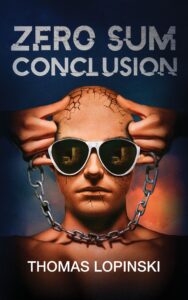Author Thomas Lopinski is chatting with me today about his new speculative dystopian novel, Zero Sum Conclusion.

Bio:
Thomas grew up in a quaint small town in Illinois called Georgetown, which had one stoplight, one high school, one square, one lake, one police car, and one hundred ways to get into trouble. It was a wonderful place to be a child. He studied at the University of Illinois and later moved to Southern California with his family to work in the music industry. In Southern California, he’s had a successful career in the Film & TV Music Licensing field with Warner Bros., Universal Records and the Walt Disney Company. After the birth of his triplet daughters, Lopinski focused on writing literature and joined a writer’s group made up of his peers in the music industry. In 2012, he self-published his first novel, Document 512, which won recognition and awards from Reader Views, Foreword Review, National Indie Excellence Awards and Best Indie Books. His second novel “The Art of Raising Hell” was published through Dark Alley Press in 2015 and won Best Young Adult Novel through Best Indie Books and was a semi-finalist for Best Literary Novel through Kindle Book Awards. In 2022, Thomas released an album of original songs called “Unfinished Business” under the pseudo name “Pinski Thomas”. The album can be found and purchased on Spotify, iTunes and BandCamp. Thomas is also a member of the Independent Writers of Southern California (IWOSC) and has been a cancer survivor since 2006.
Welcome, Thomas, please tell us a little bit about your new release.
The Second Civil War of 2033 changed the landscape of American politics forever, forcing citizens to reimagine a society overrun by crime, greed, poverty, and aggression. Turning conventional logic on its head, every eighteen-year-old now receives a million dollars in lieu of traditional healthcare, Social Security, and Medicare. Political divisiveness has been diffused by assigning everybody as a Front-Loader or Back-Ender, depending on how they want to live and when they take their million dollars. Corporations now handle all governmental functions, saving taxpayers money while cleansing the internet of misinformation and immoral values. What could possibly go wrong?
It’s eighty-four years after 1984, and the story centers around an FBI agent named Edgar Gorman, who has recently lost his soulmate to illness. His life spirals out of control after a computer glitch rewrites his history. Along the way, he meets a young teenage boy named Ketchum, who also finds himself on the wrong side of the law. After being swindled out of his newfound fortune by a beautiful girl, Ketchum enters into “Zero Sum Conclusion.” Edgar’s and Ketchum’s lives collide and, by joining forces, they eventually save each other.
Zero Sum Conclusion is a futuristic, satirical exploration into the political, religious, and social landscapes of today — and what might become of America if we continue on the path we’re currently hurtling down.
What inspired you to write this book?
The political and social climate over the last eight years, plus the pandemic. I found myself overwhelmed by what was happening in America during that period and unable to focus on any one subject for my next novel. Then one day I asked myself, “What would happen if life in America reverted back to the cultural and social climate found a hundred years ago, while technology continued to advance exponentially?” Top that off by setting the novel fifty years into the future and I had my next book.
Excerpt from Zero Sum Conclusion:
The blast reverberated across the desert into a desolate canyon and back. The smoke swiftly dissipated into the parched air. Double Down crawled over on the ground to examine the body for a heartbeat. There was none. He rose to his feet and removed the gun from Ketchum’s hands. “Thanks for saving my life.” Without saying another word, he dragged the dead bodies over to the large boulder and hid them both out of sight.
Ketchum stood shellshocked and stoic as he watched the corpses slither away. Any innocence that was left of his youth was forever lost in the moment, seeming to follow in the shadows of the two dead bodies and bury itself in the sand. His eyes trailed Double Down as he returned and got in the vehicle. All the while, he said nothing and ignored the tears that lingered but would not drop. What was there to say?
“Let’s get out of here before somebody comes,” Double Down said as he started the engine. His voice brought Ketchum out of his trance, triggering him to instinctively move around to the other side, open the door and hop in.
They plugged in the GPS coordinates for the Indian Reservation and drove away. Traveling on the main roads was too risky so they veered off onto dirt paths or abandoned fields whenever possible. A few dilapidated buildings scarred the landscape, clinging to what was left of wrought iron frames and crumbling piles of mortar. A helicopter crossed overhead at one point and hovered above. Double Down picked up a ball cap with the Dunes logo from the seat and waved it out the window until the chopper flew away.
A few minutes into the drive, Ketchum peered out over the endless array of eroding mesas and quietly said, “I suppose our lives will never be the same again.”
Double Down glanced at his compadre before returning his gaze back to the road ahead. He’d already had his chance to make something of himself in this world, but Ketchum’s life had been cut short before it’d even started. There weren’t going to be any pool parties, extravagant gifts, or excursions on a yacht in his future. Nor was he likely to ever find a true love or see his family again. The prospects made him weep inside but he did his best not to show it. “I’d say we’re marked men for sure. I don’t know how you recover from that.” He reached over, rubbed Ketchum’s full head of hair, and added, “But there’s a new self-defense clause in the Constitution that makes it legal to shoot someone in pretty much any situation. It’s our word against theirs, and since there were no video feeds streaming up to the Intranet, and since they’re dead…,” he glanced over and winked before finishing his thought, “…I guess we can say whatever we want. Sooo, anything’s possible.”
Ketchum gingerly nodded and gazed out over the horizon. After a few minutes, he asked, “So, what’s Soylent Green?”
Double Down snickered up a smile with a small grunt thrown in while recalling the memories. “It was an old movie from the twentieth century, probably a hundred years ago, I guess, where food was scarce and the world was overpopulated and dying ― you know, real dystopian shit. Anyway, at the end of the film, the detective figures out that the food they’ve been eating is people. He yells at the top of his lungs, “Soylent Green is people, Soylent Green is people!”
Ketchum rocked his head back and forth while declaring, “Boy, that gives new meaning to the phrase ‘going green.’”
“Where do you think those shamrock shakes come from?” A rosy grin emerged on Double Down’s face as they both laughed.
What exciting project are you working on next?
I’m working on a follow up to Zero Sum and kicking around a few other ideas. I’ve had this title floating around in my head the last few years that I can’t seem to shake and know there’s a story there somewhere but just haven’t quite placed my finger on it yet. The title is The Man Without a Butt. I’m serious.
When did you first consider yourself a writer?
I spent decades playing music in small-time bands and writing mediocre songs. Then when I was hired at Universal Records in 2000, a group of music industry friends invited me to join their writer’s group. At the time, it was more of an excuse to get out of the house, drink a few beers, play darts and exchanged chapters we’d written that month. That’s when I fell in love with writing and thought I had potential. Yet, it wasn’t until I won a Best Young Adult Novel award in 2015 that I realize, wow, I am a writer.

Do you write full-time? If so, what’s your workday like? If not, what do you do other than write and how do you find time to write?
I’m in the process of transitioning from working full-time for someone else to writing full-time for myself. It was a challenge finding the time to write while working 9-5 with triplet daughters in the house and all the other distractions that happen in life. Sure there were the late night sessions and weekends where I found time to write, but a series of misfortunate events highlighted by months fighting cancer and recovering from heart surgery allowed me the opportunity to concentrate on the craft. I think I wrote two books during that down time. I don’t recommend that route for anyone out there, but that’s what got me to where I am today. Making lemonade out of lemons, I guess.
Now that I’m a full-time writer, we’ll see.
What would you say is your interesting writing quirk?
I do my best writing in my back yard sitting next to my pool. I’m constantly inspired by the elements around me and being outdoors. Fortunately, you can do that almost year around in Southern California. It’s become my writing sanctuary.
As a child, what did you want to be when you grew up?
Ha! I guess I had aspirations of being President, like many, but that morphed into becoming a rock n’ roll musician in my teens. By the time I’d become a seasoned adult and witnessed the darker realities of both occupations, the luster had completely worn off and I ended up taking another path.
Anything additional you want to share with the readers?
It’s never too late to start another career. You just have to put one foot in front of the other.
Links:
Website | Facebook | Blog | Amazon | Goodreads | Twitter | Instagram
